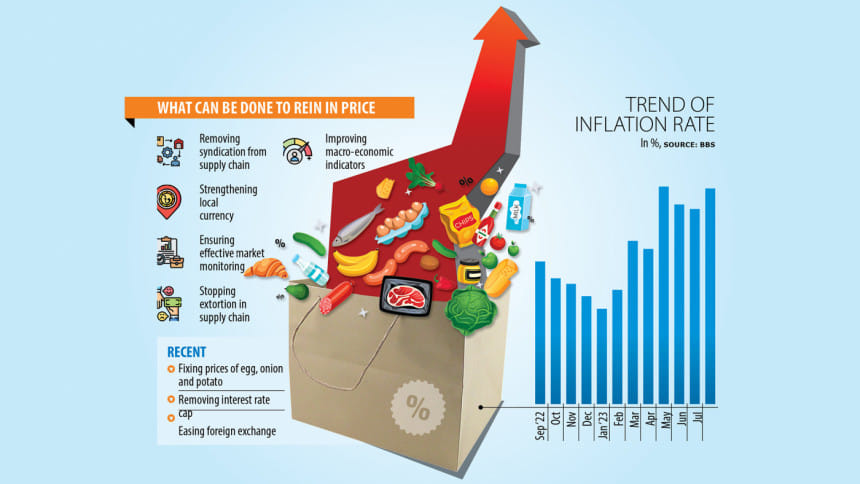Will price controls work to tame inflation?

A persistently higher inflation for more than a year has hit the low-income, the poor and the fixed-income people in Bangladesh hard, significantly eroding their purchasing power.
The situation has prompted the government to cap the prices of some essential goods, namely eggs, potatoes and onions, after they became dearer, in a bid to give some respite to consumers.
Usually, economists oppose most price controls since the move proves to be unsuccessful since fixed prices are not followed in most cases. As a result, people's suffering doesn't lessen.
"The government should not fix prices. Rather, it should remove all the flaws in the supply chain so that the market can perform efficiently and no group can use it for their own interest," said MK Mujeri, a former director-general of the Bangladesh Institute of Development Studies, a state-run think-tank.
He argues that if the government fixes prices in a market economy, it normally does not work. "Moreover, it creates problems when it comes to ensuring a demand and supply-based price level."
In an unprecedented move, the agriculture ministry, on September 14, fixed the retail prices of eggs, potatoes and onions. Still, they are being retailed at higher rates.
A former chief economist of the central bank, Mujeri says Bangladesh is an import-dependent economy, so a significant depreciation of the local currency against the US dollar has had a huge impact on inflation.
The taka lost its value by about 25 percent in the past one year and a half amid the fast depletion of the foreign currency reserve caused by higher import bills.
According to Mujeri, as the central bank has kept the local currency strong artificially for a long time, its impact on the economy is getting clearer day by day.
He urged the government to take supportive policies to make the macroeconomic indicators stronger.
"If the local currency drops further, inflation will be fueled further."
The overall inflation rose 23 basis points to 9.92 percent in August driven by a 12.54 percent surge in food inflation. It was 9.76 percent in the previous month.
Mujeri said the central bank should not use the policy rate to bring down the inflation rate because the tool can control excess demand.
"It is not the demand that is sending prices higher alone. The higher inflation is largely because of the bottlenecks in the supply chain. A vested group is raising prices through syndication. This weakness of the market should be removed."
Citing a survey of the Chicago Booth School, the Federal Reserve Bank of St Louis says most economists don't' believe that the 1970s-style price controls could successfully limit US inflation over a 12-month horizon, and many of those economists cite high costs of controls.
Appropriate fiscal and monetary policies can reduce inflation without the costs imposed by price controls, it said.
"The government should have a solid intention to reduce the inflationary pressure and improve the market monitoring," said Prof Anu Muhammad, a former chairman of the economics department of Jahangirnagar University.
He said there is no comprehensive study on the economic indicator, so the government has decided to import eggs all of a sudden.
"Importing items is not the solution. The problems lie in the market mechanism instead of the supply shortage."
Prof Rashed Al Mahmud Titumir, chairman of the Department of Development Studies at the University of Dhaka, says inflation continues to remain unabated due to policy inaction by fiscal and monetary authorities, despite causes and solutions known to the central bank and the finance ministry.
The price level has remained high since the Bangladesh Bank has had to print a record amount of money to finance the government in the wake of lower revenue income. The dwindling foreign exchange reserve, the shortage of foreign currencies and associated depreciation have jacked up prices.
Zahid Hussain, a former lead economist of the World Bank's Dhaka office, says the policy of price ceiling is a 50-year-old model and it has been scrapped as it does not work.
"The price of some essential goods has turned volatile suddenly, not because of the mismatch in supply and demand but because of the collusion among big companies."
He said the price ceiling can work in front of the monitoring team. "However, in the worst-case scenario, both goods or sellers can disappear from the market. As a result, it can backfire."
"So, the government should eliminate the collusion and monitor whether market players are following competition rules."
Prof Titumir recommended the central bank stabilise the price levels by cutting the printing of money.
Prof Anu Muhammad urged the government to stop extortion at every level of the supply chain and eliminate collusion among large firms.

 For all latest news, follow The Daily Star's Google News channel.
For all latest news, follow The Daily Star's Google News channel. 








Comments